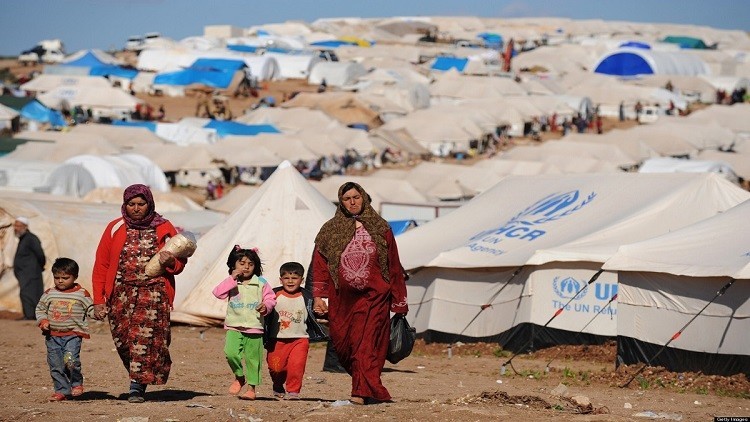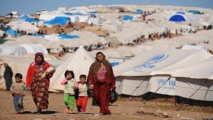I don’t remember cannibalism in Sarajevo, but I do remember a bleak day in the winter of 1993 when a dog with a human hand limped by—no doubt also starving—from the site of a nearby shelling.
It was gruesome, but by then the population was so psychologically weary that my Bosnian friend, Gordana, looked up from a sandwich (the bread of which was largely sawdust) and said, in the flattest of tones: “That dog. Has a hand. In its mouth.”
Similar hideous scenes occur daily in Eastern Aleppo, where some 250,000 people have been under government siege since September and enduring wartime strife for five years, and Daraya, where 8,000 people withstood four years of siege before the city fell at the end of August. In Sarajevo, even more than the crashing shells, more than the snipers’ bullets embedded into knees and spines and lungs, more than the exhausted surgeons I watched perform in the battered war hospital, perhaps the cruelest thing was the attempt to destroy the spirit. Sieges destroy the body—as was clear in Bosnia then and in Syria now—but once again, what’s far more damaging is the annihilation of the soul.
“My books! My books! How can I live without my books!” cried my friend Mario Susko, a renowned Bosnian poet, on Christmas Eve in 1992, as we burnt his beloved books in place of firewood. That night we ate tinned Spam, from the humanitarian rations box, and were grateful to have even that.
The hell finally lifted after more than 11,541 people died—over 500 of them children. I can say without drama that those years, 1992 to 1995, were the most potent of my life: professionally, personally, emotionally. I was there along with my colleagues who had reported the war as a testimony so that we would never forget what happened during the siege.
We did this partly as committed journalists. Unlike the war in Syria, which has virtually no independent witnesses, in Sarajevo you could pretty much go to any front line or travel with soldiers as long as you took responsibility for your own life. This kept the Bosnian tragedy in the forefront of the public awareness, to the point where Margaret Thatcher, then the U.K.’s former prime minister, took a firm stand to end the war, citing a Sunday Times story I’d written about a child who was blinded by shrapnel in Srebrenica. That city became famous for the mass killing of some 8,000 Muslim men and boys in 1995.
But there was another reason we stayed, and it was far more important to me and my friends: A siege isolates its inhabitants from the rest of the world. We wanted to show to people on the outside our Bosnian colleagues, as well as the fighters who were defending their city under a punishing arms embargo, and the ordinary people who were dodging snipers’ rounds. There was little hope that anyone was coming to save them, but we felt that if we left, we would be giving them a clear sign: that they were truly abandoned.
Now, with the world watching Aleppo burn, Daraya fall, and Idlib and other Syrian cities suffer so brutally, Pope Francis’s description of Syria as “abandoned and beloved” rings chillingly accurate. After Bosnia, I was sure the international community would never again stand by and watch in silence as hundreds of thousands of people were bombed relentlessly, starved, beaten, traumatized, and denied the most basic human rights, including education and medical facilities. During the height of the worst years in Sarajevo, from 1992 to 1994, you could chart the ebb and flow of the city’s hope, like the steady flow of the Mijacka River, whose shelled bridges we had to run across to avoid getting hit by snipers. Food supplies ran out; soldiers were getting slaughtered on the fronts; the hospitals’ generators went down.
Another woman told me she missed watching her fruit trees bloom, and being able to go outside to pick peaches and apples in the warmer weather without the fear of being blown to shreds.
Mohammed, a friend of mine in Daraya, wrote to me one afternoon asking politely if I could send some of my articles from Sarajevo, “So we can understand how the Bosnian people survived and we can learn from them.”
It gave me an idea. My Bosnian friends were some of the most resilient souls I knew. I thought they could offer psychological support about how to get through the darkest days, from siege survivors to those still living through it. “Does he want to know how to make oil lamps or how to stop going insane?” Aida Cerkez who lived through the Sarajevo siege and is now an Associated Press reporter in the city, wrote to me. “I mean; we can help him with both.”
This summer, I launched the Sarajevo-Daraya channel on WhatsApp. Initially, we were three—Mohammed, Aida, and me. Then more people joined in. Everyone introduced themselves and tried to offer the most concrete suggestions to stay alive—and sane.
Samir (with whom I shared some of my happiest moments during Sarajevo’s siege; we watched Clint Eastwood’s A Fistful of Dollars when the electricity came on for a fleeting moment in 1994), insisted that maintaining humor was the most important thing. “The water is running and she is hot!” a French reporter, now dead, would call out to all of us in those moments when real life broke through.
Other suggestions to stay sane: Zoran, my godson’s father, who had served in the Bosnian Army, suggested playing cards and recounted the night that the most shells fell on Sarajevo. Nihad, who was a young boy during the war, gave a list of films that Mohammed might be able to see, which would offer spiritual and emotional fortitude if the electricity ever went on in Daraya.
And every day we checked in on Daraya even as it became clear, by late July, that the city was about to fall.
“How heavy is the shelling in Daraya today?”
“Hey Mohammed, you in the basement again?”
We sent maps back and forth of the shifting frontlines, of (useless) diplomatic maneuvering, of the situations in other cities. We told Mohammed and his friends that they were in our thoughts, to be brave, that peace would finally come. It was a very small thing, but we wanted him to know that the siege hadn’t cut him off from the outside world completely—that we knew he was there, that he wasn’t completely abandoned. We wanted to serve as an emotional lifeline.
When Daraya—a symbol of the Syrian resistance from the very early days of the war, when activists came out to meet government soldiers with bottles of water and flowers—finally fell, we did not hear from Mohammed for a while. Then he resurfaced, first in Idlib, before traveling by bus to another city inside Syria.
Early on in the Syrian war, I was tempted to draw comparisons. Then as now, there was fury at the U.N., and the seeming indifference of its officials. I recall our disgust in Sarajevo when then-U.N. Secretary General Boutros-Boutros Ghali stopped in the city and blithely said there were 10 places in the world worse off than the Bosnian capital. When Syria was finally the focus of the U.N. General Assembly meeting in September, American and French attempts to nail the Russians on war crimes were too little, too late. And as a student of international relations, I had been taught how wars start, how wars end. Often they end when fighters are exhausted, or when, as in Bosnia, diplomacy has the strong backing of the mightiest power on earth—the United States. But America is in an election cycle. Even while the news from Aleppo reaches people who try to listen, try to absorb, it’s impossible to truly understand. How can you know what siege really means unless you have known the joy of seeing a tap with running water after you have had none for several years?
A diplomat friend this week told me he thinks the war in Syria is very close to ending, “because wars end when the victors get the territory they want—and have the control and power they want.” Assad, with the help of Russia and Iran, whose hands are equally bloodstained, is barreling through the country, taking more territory, killing those who resist or simply those who are in the wrong place at the wrong time.
“What do you want now?” I ask most of my Syrian acquaintances, and they all say the same thing: Peace. And often: “I want to go home again.”
But the Syria they knew will never be again, and their homes will be impossible to find. Like Bosnia, it was so much easier to rip Syria apart than it will be to put it back together. The beloved, abandoned country can now only live on hope.
----------------
The Atlantic









 Home
Home Politics
Politics











